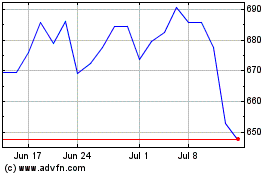Netflix Loses Bid to Release Relativity Films Ahead of Theaters
May 27 2016 - 4:10PM
Dow Jones News
A bankruptcy judge on Friday delivered a defeat to Netflix Inc.,
which has fought for the right to release two films produced by
Relativity Media LLC on its streaming platform ahead of their
expected theatrical release.
Judge Michael Wiles of the U.S. Bankruptcy Court in Manhattan
issued an order forbidding Netflix to release the films, saying a
premature debut of the movies could prove "devastating" for the
Hollywood studio that he released from chapter 11 earlier this
year.
Relativity's fragile reorganization plan is dependent upon the
theatrical release of its most anticipated films: "Masterminds," a
comedy starring Zach Galifianakis and Kristen Wiig, and "The
Disappointments Room," a horror film starring Kate Beckinsale.
"It is my responsibility to ensure the plan I approved is
carried out," the judge said in court Friday. Allowing Netflix to
proceed "would threaten the bankruptcy process…with devastating
consequences to the plan and distributions" to creditors.
Earlier this month, the judge had made clear he wouldn't allow a
premature release of the films. Friday's ruling makes his decision
official.
Lawyers for Netflix say they plan to pursue an appeal. Netflix
had also proposed having the dispute settled in arbitration rather
than bankruptcy court, which Judge Wiles flatly rejected.
Relativity filed for bankruptcy last summer, carrying more than
$1 billion in debt. The company's reorganization plan, which won
final court approval in March, calls for the two films to be rolled
out in theaters in September and December and later released abroad
and on streaming services. The theatrical debut, the company says,
is critical to repaying loans it took out to produce and market the
films.
Judge Wiles on Friday chided Netflix for failing to raise the
potential for conflicts over the release timeline during the final
hearing on the reorganization plan, which focused on projected
revenue from the films' theatrical release to help demonstrate the
plan's financial viability.
"Netflix had an obligation to raise these points," he said.
"This could not have been clearer."
The judge also made it clear he thought Netflix was threatening
to release the films to gain leverage in a long-standing dispute
between the two companies. Netflix was a vocal opponent of
Relativity's reorganization throughout the bankruptcy, hitting it
with objections that questioned its feasibility. But those
objections were either dropped or overruled, leaving Netflix stuck
with a contract that obligates it to buy as many as 15 films a year
from Relativity.
"Netflix waited so that it could interfere with implementation
of these arrangements to have leverage to terminate the contract,"
the judge said.
Court papers show Netflix has paid Relativity at least $283
million in licensing fees since 2010 for exclusive rights to offer
Relativity's films on its video-streaming service.
Relativity's restructuring cut its initial $1.2 billion debt
load down to about $314 million, giving the studio a chance to get
back on its feet. Court papers show Relativity hopes to release as
many as 22 films over the next three years, which it hopes will
bring in as much as $2 billion.
Write to Tom Corrigan at tom.corrigan@wsj.com
(END) Dow Jones Newswires
May 27, 2016 15:55 ET (19:55 GMT)
Copyright (c) 2016 Dow Jones & Company, Inc.
Netflix (NASDAQ:NFLX)
Historical Stock Chart
From Mar 2024 to Apr 2024

Netflix (NASDAQ:NFLX)
Historical Stock Chart
From Apr 2023 to Apr 2024
